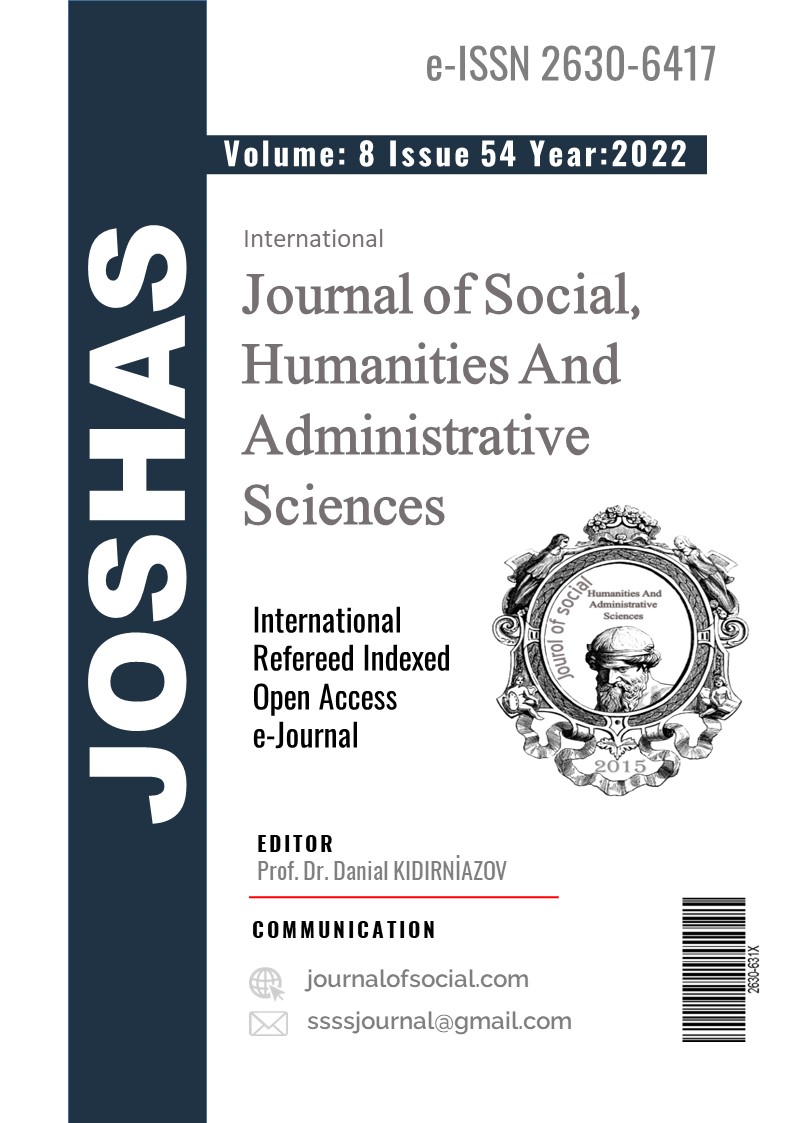Author :
Abstract
Kamu kurumlarından biri olan okullarda rekabet anlayışının baskın olduğu yerlerdir. Bu ortamlarda mevcut bulunan mesleki etik ilkelerin sağlıklı bir şekilde uygulanması oldukça önem arz etmektedir ve örgütsel bağlılığı olumlu veya olumsuz yönde etkilemektedir. Yapılan çalışma ilkokullarda yönetimde etik ilkelerin uygulanışına dair sınıf ve anasınıfı öğretmenlerinin görüşleri alınmıştır. Bu araştırmanın çalışma grubunu Karaman merkez ilçede değişik ilkokullarda görev yapan 5 sınıf öğretmeni ile 5 anasınıfında görev yapan anasınıfı öğretmeni oluşturmaktadır. Yarı yapılandırılmış görüşme formu kullanılarak veriler elde edilmiştir. Nitel araştırma yöntemlerinden olan betimsel analiz yöntemi çalışmada kullanılmıştır. Hazırlanan görüşme formu iki bölümden oluşmaktadır. Birinci bölümde katılımcıların demografik bilgilerini tespit etmek amacıyla 5 adet soru sorulmuş, ikinci bölümdeyse yönetimde etik ilkelerin uygulanışına dair 5 adet soru yöneltilmiştir. Araştırmanın bulgularına göre ilkokullarda öğretmenlerin yönetimde etik konusunda bir eğitim aldıkları, okullarda etik ilkelerin uygulanışına dair öğretmenlerin özellikle ödüllendirme, sınıf dağılımındaki dengesizlik, görev dağılımları, müdürlerin yönetim anlayışları ve iletişimde yaşanan sorunlar konusunda olumsuz algıları olduklarını belirtmişlerdir. Belirtilen bu noktaların örgütsel bağlılığı olumsuz yönde etkilediğini ve öğretmenlerin, öğrenci ve velilerle iletişim boyutunda yaşadıkları sorunlardan dolayı sık sık CİMER’e şikâyet edilmeleri onların üzerinde olumsuz bir şekilde baskı unsuru oluşturduğu belirtilmiştir. Katılımcı öğretmenler etik ilkelerin idareciler ve diğer paydaşlarca içselleştirilmesinin etik yönetimde oldukça önemli olduğunu belirtmişlerdir.
Keywords
Abstract
It is the place where the understanding of competition is dominant in schools, which are one of the public institutions. In these environments, it is very important to apply professional ethical principles in a healthy way and affect organizational commitment positively or negatively. In the study, the opinions of class and kindergarten teachers on the implementation of ethical principles in management in primary schools were taken. The study group of this research consists of 5 primary school teachers working in different primary schools and 5 kindergarten teachers working in 5 kindergartens in the central district of Karaman. Data were obtained by using a semi-structured interview form. The descriptive analysis method, which is one of the qualitative research methods, was used in the study. The prepared interview form consists of two parts. In the first part, 5 questions were asked in order to determine the demographic information of the participants, and in the second part, 5 questions were asked about the application of ethical principles in management. According to the findings of the study, they stated that teachers in primary schools received an education on ethics in management, and that teachers had negative perceptions about the implementation of ethical principles in schools, especially about rewarding, imbalance in class distribution, task distribution, principals' understanding of management and problems in communication. It has been stated that these points have a negative impact on organizational commitment, and the fact that teachers are frequently complained to CIMER because of the problems they experience in communication with students and parents creates a negative pressure on them. Participating teachers stated that the internalization of ethical principles by administrators and other stakeholders is very important in ethical management.
Keywords
- 1. Aydın, İ. (2016). Yönetsel, Mesleki ve Örgütsel Etik. Pegem Akademi, Ankara.
- 2. Aygün, H.E. Ve Taşkın, Ç.Ş. (2019). Öğretmen Adaylarının Öğretmenlik Uygulaması Kapsamında Bilişsel Esnekliğe İlişkin Görüşleri. Eğitimde Nitel Araştırmalar Dergisi, 7 (4), 1475-1499.
- 3. Bakan, İ. (2011). Örgütsel Bağlılık, Gazi Kitabevi, Ankara.
- 4. Baysal, A. C. Ve Paksoy, M. (1999). “Mesleğe Ve Örgüte Bağlılığın Çok Yönlü İncelenmesinde Meyer-Allen Modeli”, İ. Ü. İşletme Fakültesi Dergisi, C: 28, S:1, 7-15.
- 5. Bektaş, Ç. & Köseoğlu, M. A. (2007), “Etik Kodlarının Yönetsel Karar Alma Sürecine Etkileri ve Bir Model Önerisi”, İş ve Güç Endüstri İlişkileri ve İnsan Kaynakları Dergisi, Nisan, Vol.9, No.2, pp.94-115.
- 6. Çetin, M. & Özcan, K. (2004). Okul Yöneticilerinin Etik Davranışlarının Öğretmenlerin İş Doyumuna Etkisi. Marmara Üniversitesi Atatürk Eğitim Fakültesi Eğitim Bilimleri Dergisi, 20 (20), 21-38.
- 7. Çetin, M. (2004). Ölçüm, Örgüt Kültürü ve Örgütsel Bağlılık, Nobel Yayın Dağıtım, Ankara.
- 8. Demir, E.; Doğan, M. & Yavaş, M. (2021). “Uzaktan Eğitim Sürecinde İlkokullarda Eğitim Öğretim Gören Dezavantajlı Öğrencilerin Eğitime Erişim Ve Akademik Başarı Durumları: Karaman İlinde Sınıf Öğretmenlerine Yönelik Bir Araştırma”, International Social Mentality and Researcher Thinkers Journal, (Issn:2630-631X) 7(47): 1575-1592.
- 9. Dana, Jason, (2006).“Strategic Ignorance And Ethical Behaviour In Organizations”, Research on Managing Groups and Teams, , Vol.8, pp.39-57.
- 10. Durna, U. & Eren, V. (2005) “Üç Bağlılık Unsuru Ekseninde Örgütsel Bağlılık”, Doğuş Üniversitesi Dergisi, Sayı: 6 (2), s. 213.
- 11. Ertekin, Y., (1978), “Örgüt İklimi”, Amme İdaresi Dergisi, 11(4): 16-35.
- 12. İnce, M. & Gül, H. (2005). Yönetimde Yeni Bir Paradigma: Örgütsel Bağlılık, Çizgi Kitabevi.
- 13. Kılavuz, Raci, (2002) “Yönetsel Etik ve Halkın Yönetsel Etik Oluşumuna Etkileri”, C.Ü. Sosyal Bilimler Dergisi, Aralık, Cilt.26, No.2, pp.255-66.
- 14. Luthans, F.; Baack, Donald.; & Taylor, L. (1987). “Organizational Commitment: Analysis Of Antecedents”, Human Relations, Vol. 40, 4:219-236.
- 15. Lodahl, T. M., & Kejner, M. (1965). The definition and measurement of job involvement. Journal of Applied Psychology, 49(1), 24-33.
- 16. Mowday, R.; Lyman, T.; Porter, W. & Steers, R. M. (1982). Employee Organization Linkages: The Psychology of Commitment, Absenteeism and Turnove, New York: Academic Press.
- 18. Thompson, D. F. (1985). “The Possibility of Administrative Ethics”, Public Administration Review, pp. 555- 561.
- 19. Varoğlu, D. (1993), Kamu Sektörü Çalışanlarının İşlerine ve Kuruluşlarına Karşı Tutumları, Bağlılıkları ve Değerleri, Ankara Üniversitesi, Sosyal Bilimler Enstitüsü, Yayınlanmamış Doktora Tezi, Ankara.





